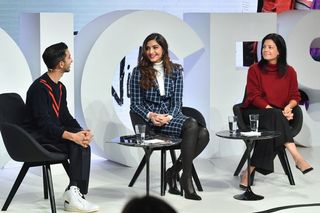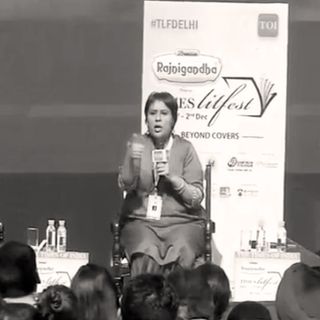
The Swaddle’s Founder, Karla Bookman, Talks Feminism and Progress at Global Summit
The gathering of movers and shakers put India under the spotlight.

“Young people are today asking a lot of questions, they are seeking answers, they want a better world. This new energy that has come has created a very subversive energy in our country, that wants to change things, that is asking a lot of questions, and that is pushing frontiers.”
With those words, Shiv Khemka, chairman of Sun Group, kicked off the India portion of VOICES, an annual gathering of big thinkers, convened by the Business of Fashion, to discuss pressing global issues and and trends across a variety of fields. At this year’s gathering, held in the UK over the weekend, India, as a rapidly ascending economic market, was front and center. And so was The Swaddle’s founder and editor, Karla Bookman, discussing the slow but sure subversion of India’s patriarchal attitudes and structures in a conversation with actress Sonam K Ahuja.
Bookman used the example of health care to highlight the shift. Women have typically accessed health information via crowdsourcing within their community — specifically a “mother-in-law and sisters-in-law, and you could see how that lens may or may not be objective.” Or from outside sources that are still colored by patriarchal norms and attitudes — like say, from the gynecologist who refuses to prescribe birth control to an unmarried woman.
“We ran a gynac survey and 1100 women responded — 50% responded that they don’t feel comfortable openly discussing sex with their gynac. The taboo and shame is operating even in the context of what should be an open conversation,” she said. “But this is really starting to change. Young women are not having it. There are lists of gynacs with whether the doctor is queer friendly, and whether they are open minded and progressive.”
“Feminism has been alive and well in India for a long time. [But women] now have more of a platform.”
Ahuja said the same culture of shame that keeps women from taking control of their health, keeps women silent about the broader inequity and even abuse they may face.
“There is a lot of shaming and victim-blaming,” she said. “It’s so prevalent in the film industry, in every industry. Unfortunately, it is a patriarchal society. Women are treated like garbage. It’s so contrary, some of the most powerful people in our country [are women], we pray to goddesses… but we still objectify women, we don’t treat them well. So, women are scared to talk about it.”
Ahuja noted the #MeToo movement was at the forefront of changing this aspect of her industry and others, and recounted her frustration at hearing jokes at the movement’s expense.
“This is not funny, we can’t take this lightly,” she said. “It has to be a complete rehaul of the way we think. And that is not something that can be slow, it has to be a push. It can’t be slow and steady.”
Challenging the kind of gender stereotypes that perpetuate such derision and limit women’s options starts at home, Bookman suggested.
“Almost 50% of graduates are women. 50% of entrants are women. But when you reach the highest levels [of work] you are talking 2 or 5%. Really what’s happening is a lot of social conditioning and family pressure that is pulling women back into the home,” she said. “It really frames their roles as wives and mothers as more significant than the roles outside of the home.”
Ahuja said she has some experience in challenging these stereotypes at home.
“My dad says he’s a feminist. I learn that from him, and I’m a feminist.” But, she laughed, “I keep telling my dad: you ruined it. The 60s and 70s were the golden years of films, where you had Saraswati Chandra, and Bandini and Sujata, these amazing feminist movies being made — and then in the 80s, my dad became a movie star, and he was this very toxic male idea of ‘me man, you woman, I protect you.’ And I was like ‘You ruined it, dad, how can you teach me this stuff?'”
Ultimately, both women agreed that change is afoot — that slowly but surely, patriarchal norms and structures are being openly challenged, attitudes and behavior condemned, and progress toward equality being made.
“Things are changing very, very quickly. What feels exciting about India right now is the pace of change. Feminism has been alive and well in India for a long time,” Bookman said. “[But women] now have more of a platform with social media, with the ability to go online and find basic health care, and to connect with other people who are questioning the status quo.”
Related


Priyanka Chopra Latest Celebrity to Need a #MeToo Tutorial
